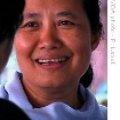Mothers line up with children, waiting for immunizations. In another line, couples with newborns wait for documents certifying their children were born in Thailand. The documents take the place of birth certificates Thailand refuses to issue. These people are refugees, and in the eyes of Thailand's authorities, they do not exist. But to Dr. Cynthia Maung, they do matter. Dr. Cynthia is a Burmese physician and a refugee herself. She makes a difference for thousands of her fellow refugees in Thailand and for many more inside Burma. For example, the Burmese physician founded the Mae Tao Clinic, a safe haven where miracles happen every day.
Dr. Cynthia fled Burma in 1988 following an army crackdown on those who demonstrated for democracy and justice.
"I joined with the demonstration group and then when the military seized power, people started disappearing, or missing, or fled to the border. I myself also decided to come to the border to continue struggling or working for political change," she says. In a two-room shack, she started doing amputations and delivering babies using instruments sterilized in a rice cooker. Young volunteer medics trained by Dr. Cynthia treat everything from landmine injuries to gastroenteritis. With donations from NGO's and foreign governments, including the United States, Dr. Cynthia's work has a reputation for a making a little money go a long way. Each year 150,000 people come here for treatment. Those who can, pay under a dollar.
Dr. Cynthia lives in modest quarters next to the clinic. She could have immigrated to the West and be making a huge salary. But for Dr. Cynthia, this is a greater calling.
"When we live here, we are not only treating illnesses, we can also educate young people who can go back and work in their community and who are very willing to promote the health activities in their village. So it is a very good opportunity for young people to give education and to give more hope," she says. The clinic trains volunteer medics who fan out into the ethnic Karen and other isolated areas of Burma. Some of the volunteers are former patients who, once desperate for help, are now the ones helping. It is they who embody Dr. Cynthia's vision. The Burmese physician says young people should be taught "not to feel as victims." Instead, she says, they should see themselves as "people who can change or improve the situation." Dr. Cynthia is reviled by Burma's military government. To the generals, she is a terrorist and an insurgent. To the thousands she treats and trains, she is a saint.
By Luis Ramirez Bangkok 25 June 2008

